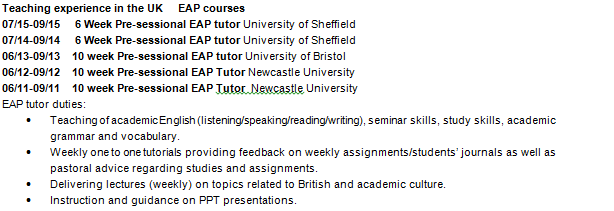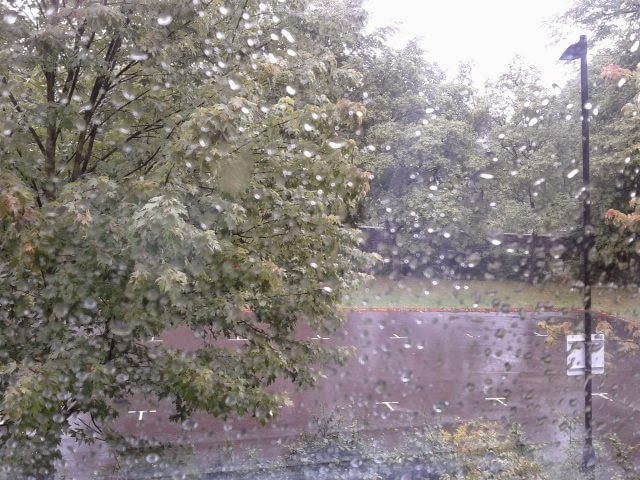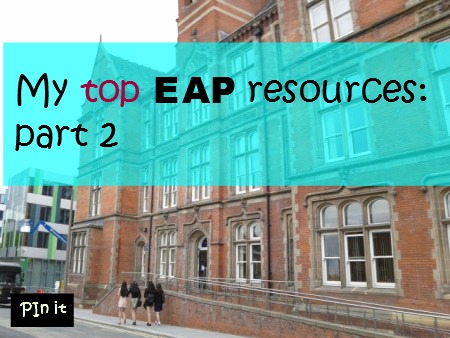Every year, right around Christmas, if you go to jobs.ac.uk or Baleap.org.uk, you will see EAP tutor posts being advertised. If you are interested in working in the UK during the summer, keep on reading. If you are curious about seeing what info I put in my CV, keep on reading. If none of this appeals to you, then, well, see you in my next post :).
So, let me begin by telling you what these jobs are. Pre sessional EAP courses are preparatory courses for post-graduate students or undergrads (more frequently students who want to continue their studies by doing an MA in the UK). The majority of the students are Asian students.
Step 1: Check out jobs.ac.uk or Baleap.org.uk. Find a post you are interested in. Then,
Download the Job Description
Once you have decided where you want to apply to, download the Job Description pdf. All posts have a document or page for this. Read it carefully. There are very often tables with essential criteria and desirable criteria. Make sure you fulfill the Essential criteria before you start your application.
There are also person specifications or teacher characteristics each Uni is looking for in an EAP tutor. They are usually in the same document. Read these very carefully and make notes of the ones you feel you ‘have’.
Your CV
Put your contact info at the top. If there is a reference code for the job, have that at the top as well.
Summary
Have a short summary of your qualifications and your work experience (very short summary!!!).
Start with your Work Experience. I use bullet points. I have the most recent job at the top and move down chronologically. I have experience teaching EAP, so I mention what this experience is ( I use bullet points and mention what my duties as an EAP tutor were).

Personal Skills/ Competencies
Write your CAN DOs/ Person specifications: This is where the notes you made will come in handy. Say what you do well. How you work with others. Your personality traits. Do not make things up because when you have the interview you will get a questions along the lines of “How do you work with others?” Or ” What can you bring to our programme?” Or ” Talk about a difficult moment and tell us how you dealt with it.”
If you feel like an ‘expert’ in something, say where.
Move on to Qualifications/ Education: I include my grades and specific information about my Master’s degree (very brief though. One line long) and my Delta module 3 spcialism (it was on academic speaking, so very relevant in this case- again one sentence long).
Articles/Publications
If you have written anything, include it in your CV.
Awards/ Scholarships
If you have been awarded a scholarship, mention that as well.
Conferences/ Presentations
Have you given any presentations at conferences or online? Put them in your CV.
Other Skills
This is where I put down my IT skills and languages.
THE END
No hobbies in this CV people. Who cares if you swim? 🙂 🙂
Top Tips
Keep the information you mention relative to the job. You are applying for a job that will ask you to focus on the teaching of academic reading/writing/speaking/ attending lectures, presentation skills etc. The fact that you have a lot of experience teaching young learners arts and crafts does not really matter. The fact that you talk IELTS does. So, keep your CV to the point.
Sure you have done a lot in your career, but only mention what matters.
Don’t have too much white space.
If you went to a conference back in 1988, it doesn’t matter. It’s too old!
Keep your CV two pages long. The people recruiting teachers for these jobs do not have all day long to read your CV.

Sheffield University ( Department of Music)
Want more info? Check out this post on EAP interview questions and pre-sessional courses.
Of course I am not a CV expert. I did get advice from a website that gives free CV advice though. So, good luck everyone! I will be in Sheffield this summer :). I hope you found this post helpful. Remember to follow my blog (check sidebar ofn how to do this) and maybe even give my facebook page a ‘like’?

Thanks for stopping by!!!














